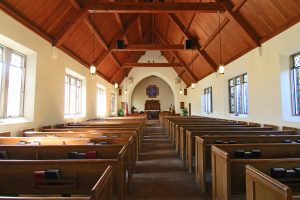Buying and Selling Churches: Commercial Real Estate Tips

By: Alex Russo, Senior Vice President
There are approximately 250,000 churches in the United States. Yet over the past two decades, the percentage of Americans who belong to a church, mosque or synagogue has declined, forcing these houses of worship to close their doors and be sold to new owners.
According to CoStar, more than 6,800 religious buildings have been sold over the past 5 years alone, and there are more than 1,400 that are currently listed for sale.
Buying or selling a church is a unique challenge in commercial real estate. Not only are there little-known nuances involved in each transaction, but the process is often a very sensitive and delicate matter for everyone involved. So, what exactly goes into the sale of a church?
Set the Baseline
After the client has engaged with a broker, the first part of the process is to determine the best use of the property. Conducting a 3rd party appraisal is critical when discussing the values on a variety of different levels:
- What is the building valued at in its current condition?
- What is the value of the land?
- Should the building be demolished?
- What would it cost to redevelop or repurpose the structure?
- What is the property’s current use or zoning?
If there’s a change of use, or zoning, a referendum may be required, which could be complex, however it also opens up many new possibilities for how the space could be used. From transforming the building into a daycare/school, restaurant or entertainment venue to simply becoming another church, there are seemingly endless options for what the space could become.
In the Buyer’s Court
Perhaps the most unique aspect of working with church properties is that it is the one instance in commercial real estate where the listing agents intentionally know the least about the actual property’s history. There is no access to, or request for, records or knowledge of issues such as lead paint, hazardous materials, etc. The property is sold “as is” with no representation or warranties from the broker.
It is always up to the potential buyer to pay for any related studies that need to be done. The listing agent’s focus is solely on the client and facilitating the sale of the property smoothly and effectively.
Time is of the Essence
Although a parish is typically in charge of the organization’s day-to-day operations, the church is technically considered an “entity”, which is named in a title that is registered with the state.
Once a church has decided to move or close, the trustees of the entity then step in to assume responsibility of all operations. As a fiduciary of the entity, the trustees assume all maintenance of the property, and are subsequently on the hook for any financial obligations to keep the building in good condition.
The longer the property lingers with the trustees, the higher the costs are to continue any landscaping, utilities, structural repairs, etc. It is in everyone’s best interest to act swiftly, and to get the property on the market as soon as possible.
Above all, the focus should always be acting in the client’s best interest and honoring the property throughout the process. Our team at Cushman & Wakefield | CRESCO understands the history, symbolism, life-events and emotions associated with each place of worship, and the impact it has on the surrounding communities.
Contact us today for more information about buying or selling a church
To learn more about how CRESCO, Greater Cleveland’s leading commercial real estate company, can help you with your property needs, contact us at 216.520.1200, or fill out the form below. A CRESCO professional will contact you shortly.